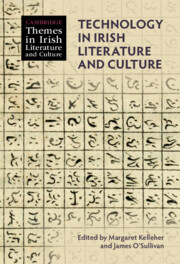Book contents
- Technology in Irish Literature and Culture
- Cambridge Themes in Irish Literature and Culture
- Technology in Irish Literature and Culture
- Copyright page
- Epigraph
- Contents
- Contributors
- Cambridge Themes in Irish Literature and Culture
- Acknowledgements
- Introduction
- Part I Genealogies
- Chapter 1 Print as Technology: The Case of the Irish Language, 1571–1850
- Chapter 2 Printing and Publishing Technologies, 1700–1820
- Chapter 3 The Optical Telegraph, the United Irish Press, and Maria Edgeworth’s ‘White Pigeon’
- Chapter 4 Technologies of Sound: Telephone/Gramophone
- Part II Infrastructures
- Part III Invention
- Part IV The Digital
- Index
- References
Chapter 1 - Print as Technology: The Case of the Irish Language, 1571–1850
from Part I - Genealogies
Published online by Cambridge University Press: 19 January 2023
- Technology in Irish Literature and Culture
- Cambridge Themes in Irish Literature and Culture
- Technology in Irish Literature and Culture
- Copyright page
- Epigraph
- Contents
- Contributors
- Cambridge Themes in Irish Literature and Culture
- Acknowledgements
- Introduction
- Part I Genealogies
- Chapter 1 Print as Technology: The Case of the Irish Language, 1571–1850
- Chapter 2 Printing and Publishing Technologies, 1700–1820
- Chapter 3 The Optical Telegraph, the United Irish Press, and Maria Edgeworth’s ‘White Pigeon’
- Chapter 4 Technologies of Sound: Telephone/Gramophone
- Part II Infrastructures
- Part III Invention
- Part IV The Digital
- Index
- References
Summary
This essay explores overlapping and intersecting modes of communicative interchange which characterised Gaelic cultural expression in the long early modern period. For a variety of complex reasons, print failed to supplant script as a communicative mode in Irish until arguably late in the nineteenth century and early in the twentieth century. Accordingly, the present essay seeks to delineate an often elusive but nonetheless intellectually dynamic encounter between print technology and communication in Irish down to the nineteenth century. Given the potent cultural and historical resonance of Gaelic script, it is argued that early modern Gaelic Protestants were acutely attentive to the ideological implications of an alignment of venerable scribal practice with print technology in the presentation of a new and radical religious programme. It is proposed that a vibrant Gaelic scribal culture was informed and energised by a creative confluence of script, print, and orality.
- Type
- Chapter
- Information
- Technology in Irish Literature and Culture , pp. 11 - 28Publisher: Cambridge University PressPrint publication year: 2023

